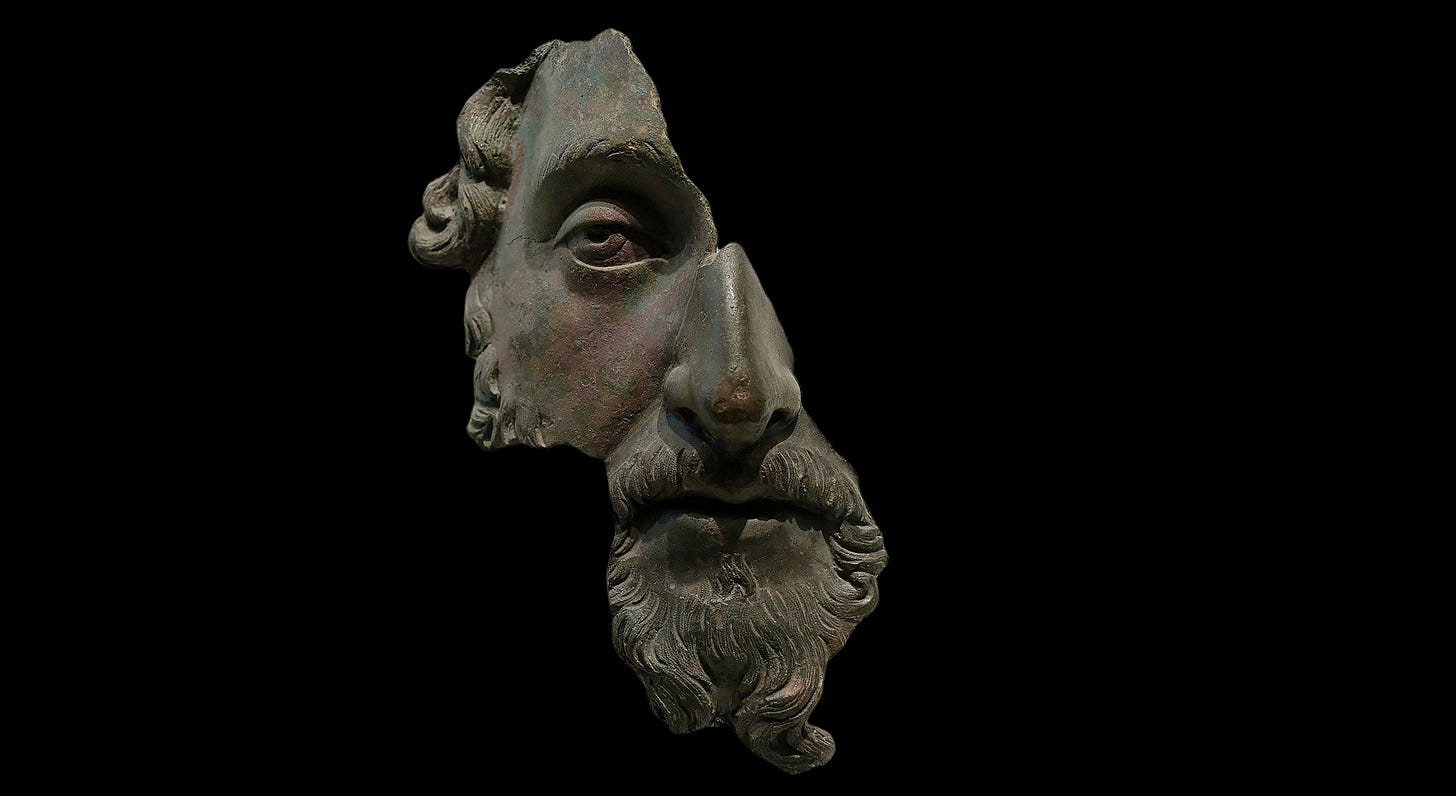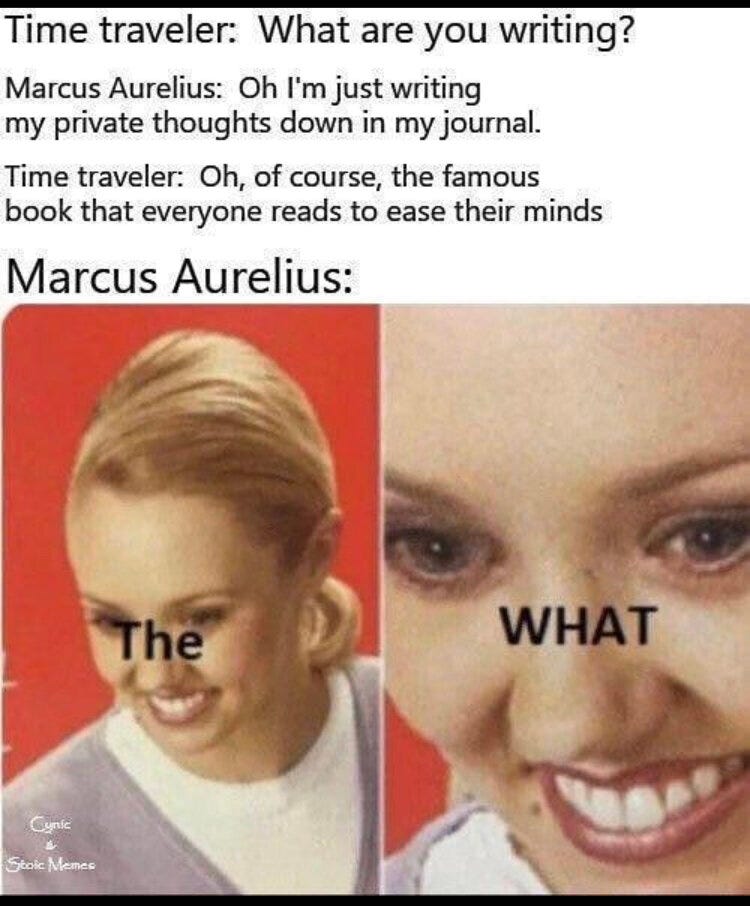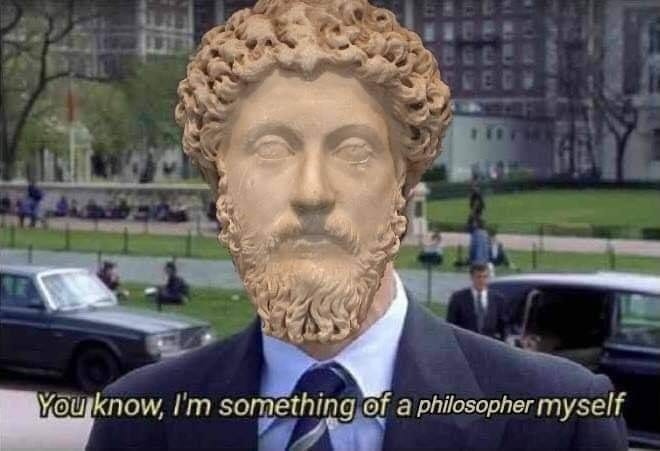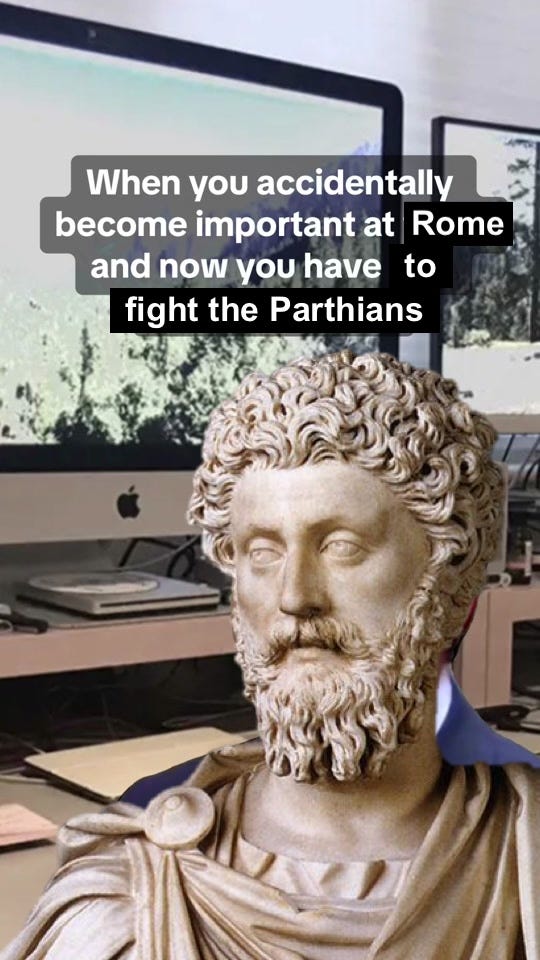Book Review: Meditations
The Emperor’s Notes App
I.
Here’s a story: at some point during the last years of his presidency, Barack Obama loses his cell phone at a basketball game.
The phone is lost forever, but about 100 years later, some of the data resurfaces on the ‘net. Most of it appears to be fragments from Barack’s notes app — paragraphs that were supposed to end up in his memoir, quotes from books he’s reading, notes to himself, reminders, even song lyrics and lines from movies.
Over the coming centuries, people bundle these scraps together and start treating the collection like it’s a real book, which becomes widely admired. By the year 3868, this document is still being passed around. People attribute the quote “I'm the first person to be alone on an entire planet” to Obama’s great wisdom, not knowing that it is in fact a line from the 2015 movie The Martian, which by the 39th century has been lost to the ages.
This is what it’s like to read Meditations by Marcus Aurelius.
II.
Marcus Aurelius Antoninus was born in 121 AD. He became co-Emperor of Rome in 161 AD along with his adopted brother Lucius Aurelius Verus (Marcus apparently insisted). When Lucius died in 169 AD, Marcus continued ruling alone until his own death in 180 AD. He was the last of the rulers later known as the Five Good Emperors, and most people consider the end of his rule to mark the end of the Pax Romana.
Meditations isn’t really a book. For one thing, it has no actual title. Early versions are called “Treatise to Himself” (Greek: τὰ εἰς ἑαυτὸν ἠθικά), or referred to by terms like “a directing of his own life by Marcus the Emperor” or “the exhortations of Marcus”. Today we usually call it Meditations, but that doesn’t come from the author.
Instead, it’s a collection of random stuff. Some of the entries are miniature essays on philosophical topics. Some are literal reminders (many entries begin, “keep in mind…”). Some are quotations from plays or books. Some of the entries seem to be self-help (“Remember not to…”). Some entries appear to be rough drafts for later entries. Some entries are inscrutable.
Meditations is esoteric, fragmented, and weirdly repetitive because it’s excerpts from his various pieces of stationery, especially from workbooks where Marcus is trying to develop his understanding of philosophy. He reframes the same ideas over and over again because he’s trying to make them stick. It’s a collection of random stuff because it really is just Marcus’s own private notes to himself.
This is more obvious in some translations than in others. For example, compare entry 8.38 from the Collier translation:
If you are so discerning, says the Philosopher, make use of your Talent to some purpose; and let your Subject be proportionable to your Parts.
…with this translation of the same passage from the 2002 translation by Gregory Hays, which is what I read:
The stench of decay. Rotting meat in a bag. Look at it clearly. If you can.
Comparing translations like this got me into some trouble. I was sitting in the park reading my print version of the Hays translation, with a different translation (probably the Project Gutenberg version) pulled up on my phone. A guy jogged by and, seeing me with a book in one hand and my phone in the other, quipped, “can’t decide, huh?” I shouted after him, “they’re two translations of the same book!” but it was too late, I had already been painted as a rube.
Meditations has a reputation for being eternal wisdom or advice to the ages, but that’s clearly at odds with the text. Marcus didn’t intend the work to be published, and probably never expected anyone else would even read it. Take for example entry 8.25, which reads: “Veras, leaving Lucilla behind, then Lucilla. Maximus, leaving Secunda. And Secunda. Diotimus, leaving Epitynchanus. Then Epitynchanus. Faustina, leaving Antoninus. Then Antoninus.” This may have meant something to other Romans of the time, but even just a few generations later, it would be quite hard to catch all those references.
Other passages wouldn’t even make sense to other Romans. They clearly mean something to Marcus and Marcus alone. Like entry 1.7, where he remembers letters “like the one [Rusticus] sent my mother from Sinuessa”. Or entry 1.17, where he thanks the Gods for “remedies granted through dreams … [like] the one at Caieta.” Or entry 1.16, when he reminds himself of “most of the things at Lanuvium” and “the way [my adopted father] accepted the customs agent’s apology at Tusculum”. We have no idea what happened between the custom agent and Antoninus Pius at Tusculum, and neither would Marcus’s contemporaries.
The text is divided into 12 books, but there’s no clear structure. It’s not clear why the books appear in the order that they do, not clear if they were put in that order by Marcus or by a later editor. The divisions between books may just represent the individual papyrus rolls that Marcus originally wrote on, and we are in some sense receiving a copy of 12 of his scrapbooks. When one roll filled up, he started another.
The books are usually divided into individual entries, and we can use entry numbers like “1.11” to refer to the eleventh entry in Book 1. But it’s not always clear where one entry ends and the next one begins, and in some cases this is a question Marcus himself wouldn’t have been able to answer. So different translations sometimes disagree on where to put the divisions between entries.
The only book with any clear structure is Book 1, where Marcus provides something like an autobiography. He lists seventeen influences on his life (mostly his teachers and relatives, but the last entry is “The Gods”) and writes about what they taught him. This seems the most like an actual book or at least an actual essay, and may have been composed later than the other parts of Meditations.
III.
Marcus was maybe a fine emperor, but it’s not clear why we should look to him for advice.
He wasn’t a tyrant, but neither were his policies all that different from previous emperors. He didn’t even preside over an era of great peace — he spent most of his reign fighting wars to keep the Empire from collapsing. And he botched one of the most important parts of the job when he passed the throne on to his son Commodus, a tyrant so unfit for the role that he was eventually murdered by his own people.1
Marcus seemed to view being Emperor as a duty, even a burden. What he really loved was philosophy.
One of the things I learned from reading Meditations is that the term “Stoic” comes from the Greek word for porch. Stoicism was named after the Stoa Poikile (ἡ ποικίλη στοά), or "painted porch", a portico on the north side of the Agora in Athens where Zeno of Citium and other early Stoics hung out and discussed their philosophy. Even in English, Stoicism used to sometimes be called “the School of the Porch”.
So a more accurate word for “Stoic” might be “Porchie”. Combine this with the fact that “cynic” is just the Greek word for “dog”, and you start to realize that a different standard of translation could just as easily have given us "Porchies" and "Doggies" instead of "Stoics" and "Cynics."
If Marcus is your introduction to Stoicism, I can see why you would find things to like here. But despite his reputation as the quintessential Stoic, Meditations doesn’t contain that much Stoicism. There’s only one explicit reference, and a few quotes from Stoic philosophers. Many of his influences weren’t Stoics, and Marcus is constantly referencing other schools of philosophy, like Cynics, and even *gasp* Epicureans.
On top of this, Marcus didn’t make any original contributions to Stoic philosophy. The Stoicism in Meditations is all stuff he’s recording from other thinkers, sometimes even in the form of direct quotations. If you want to know about historical Stoicism, you’re better off going straight to Epictetus, who Marcus is reading and copying down (e.g. entry 4.41 among others).
As for his personal life, Marcus isn’t exactly an inspiring moral example. Like all upper-class Romans, he owns many slaves, and doesn’t seem to think there’s anything wrong with that.
In entry 1.16, he writes that he admires his adoptive father for avoiding “bathing at strange hours, no self-indulgent building projects, no concern for food, or the cut and color of his clothes, or having attractive slaves.” Make up your own mind, but one of these things seems much less admirable than the others to me, and it seems weird to compare them.
In entry 1.17, Marcus prides himself on not having taken sexual advantage of two of his own slaves (Benedicta and Theodotus). But he doesn’t seem to think it would have been wrong to have taken advantage of them, he seems to be proud because this restraint shows that he has mastered his passions.
This intense detachment, even to the point of dissociation, is a weird red flag throughout the book. “Perhaps the most depressing entry in the entire work,” says translator Gregory Hays, “is the one in which Marcus urges himself to cultivate an indifference to music”:
Analyze the melody into the notes that form it, and as you hear each one, ask yourself whether you’re powerless against that. That should be enough to deter you. (11.2)
It’s also weird when he thanks the gods for the fact “that I wasn’t more talented in rhetoric or poetry, or other areas,” because, “if I’d felt that I was making better progress I might never have given them up.” (1.17)
There is some good stuff in here, especially in Book 1, where Marcus is listing people who have been important in his life and the “debts and lessons” that he owes to them.
Like 1.10, which many people could stand to hear:
THE LITERARY CRITIC ALEXANDER [taught me to] not to be constantly correcting people, and in particular not to jump on them whenever they make an error of usage or a grammatical mistake or mispronounce something, but just answer their question or add another example, or debate the issue itself (not their phrasing), or make some other contribution to the discussion—and insert the right expression, unobtrusively.
This one (1.12) also stuck with me:
ALEXANDER THE PLATONIST [taught me to] not to be constantly telling people (or writing them) that I’m too busy, unless I really am. Similarly, not to be always ducking my responsibilities to the people around me because of “pressing business.”
When it comes to Marcus’s personal contribution, this is why I find Obama makes for a good comparison. Even several hundred years in the future, I suspect people will still be interested in a glimpse of the private thoughts of an American President. These are the reflections of one of the most powerful men of his era — it’s hard not to be at least a little curious.
So, what do we learn about such a man from reading his notes? Mostly, Marcus seems depresso. People treat Marcus like a font of wisdom, but there’s a lot of “did you ever notice how everyone sucks?” and “isn’t it hard to get out of bed in the morning?”
Trouble with getting out of bed is a recurring theme, like in entry 2.1:
When you wake up in the morning, tell yourself: the people I deal with today will be meddling, ungrateful, arrogant, dishonest, jealous, and surly. They are like this because they can't tell good from evil.
Sometimes he is morbid, like in entry 8.34, where he asks, “Have you ever seen a severed hand or foot, or a decapitated head, just lying somewhere far away from the body it belonged to…?”
Marcus constantly reflects on death. If anything, he seems relieved by the thought of its eventual arrival, like in entry 8.2: “For every action, ask: How does it affect me? Could I change my mind about it? But soon I’ll be dead, and the slate’s empty.”
There’s a lot of what can only be called vagueposting, like entry 4.6, which begins, “That sort of person is bound to do that.” Then he goes back to thinking about death: “You might as well resent a fig tree for secreting juice. (Anyway, before very long you’ll both be dead—dead and soon forgotten.)”
He shows a lot of contempt for his fellow humans, like in entry 4.48: “In short, know this: Human lives are brief and trivial. Yesterday a blob of semen; tomorrow embalming fluid, ash.”
Sometimes he is ???, like in entry 9.37: “Enough of this wretched, whining monkey life.”
He even talks back and lectures himself, like in this absolute classic dialogue from Book 5:
At dawn, when you have trouble getting out of bed, tell yourself: “I have to go to work—as a human being. What do I have to complain of, if I’m going to do what I was born for—the things I was brought into the world to do? Or is this what I was created for? To huddle under the blankets and stay warm?
—But it’s nicer here....
So you were born to feel “nice”? Instead of doing things and experiencing them? Don’t you see the plants, the birds, the ants and spiders and bees going about their individual tasks, putting the world in order, as best they can? And you’re not willing to do your job as a human being? Why aren’t you running to do what your nature demands?
—But we have to sleep sometime....
Agreed. But nature set a limit on that—as it did on eating and drinking. And you’re over the limit. You’ve had more than enough of that. But not of working. There you’re still below your quota.
You don’t love yourself enough. Or you’d love your nature too, and what it demands of you. People who love what they do wear themselves down doing it, they even forget to wash or eat. Do you have less respect for your own nature than the engraver does for engraving, the dancer for the dance, the miser for money or the social climber for status? When they’re really possessed by what they do, they’d rather stop eating and sleeping than give up practicing their arts.
Is helping others less valuable to you? Not worth your effort?
IV.
Many people seem to think that becoming famous would give them a kind of deep and lasting satisfaction. Even when they hear famous people complain about how fame is a burden, how you can’t leave your house to go to the deli, they still imagine that for a celebrity, not being able to go to the store is an experience of sublime melancholy. And when you cut your toenails as a celebrity, you’re not just cutting toenails, they’re famous person toenails. In reality, it’s simply the normal bullshit of not being able to leave your house to go to the store.
I’ve never been Emperor of Rome, but my limited experience with gaining positions of respect tells me that it is not profoundly satisfying in the way people imagine. In fact, it can be quite stressful. What Marcus writes definitely matches this experience.
Meditations is supposedly a favorite of presidents and ministers, and I can see how modern politicians would find his reflections reassuring. They worked hard to become senator or president, thinking it would fix them. But instead they just get piled on with more crap. The private moments of their lives contain the same tedious tasks as they did before. It must be a relief to read something that confirms it’s not just you, becoming important at work has sucked for the last several thousand years.
I’m reminded of Robert Cottrell’s review of the book Crassus by Peter Stothard, where he gives the following summary.
In brief: Crassus crushes Spartacus, makes a fortune in real estate, bankrolls Julius Caesar, partners up with Pompey, worries about seeming wussy by comparison, decides to invade Parthia for no particular reason, gets killed.
The book is part of Yale's Ancient Lives series, a series which hopes to persuade us that the big questions in life “have changed very little over the course of millennia”. I finished Crassus thinking exactly the contrary.
The ancient Rome of Gibbon is so varnished over with irony and high style that it reads like fiction. The ancient Rome of Stothard reads more like a newspaper delivered two thousand years late. Everything that happens in Crassus is described in admirably straightforward terms. But I can scarcely guess at the psychology of the people involved, nor model the choices that they faced.
The richest person on Earth invades a big foreign country in person, at the head of his own army, on spec, just for the lulz, and loses? Not to mention the six thousand slaves he crucified earlier in life along the Appian Way? I suppose if you could graft stem-cells from Vladimir Putin on to stem-cells from Yevgeny Prigozhin then you might grow something that ticked most of the boxes, but I don't understand those people either.
Ultimately, that’s what I got out of reading Meditations.
I didn’t have to read any dead Romans during my education, which may have been an error on the part of my teachers. But it used to be that if you got any sort of education at all, it involved reading a lot of dead Romans.
That probably made sense in the first few centuries. But a couple of hundred years after the fall of Rome, these guys might have started coming across as pretty alien to the average reader. Maybe this is why Marcus stood out.
Marcus lived almost 2000 years ago. He’s from a different time and a very alien culture. He was Emperor of Rome for almost two decades, one of the most powerful men who has ever lived. Other Ancient Romans, like Crassus, behave strangely and might seem inscrutable. But in his private thoughts, Marcus shows human follies and weaknesses that are uncomfortably familiar, even to a person of the 21st century. He’s very relatable, even if I can’t always personally relate.
Commodus did have some remarkable qualities. They say he was such a skilled archer that he could shoot the heads off ostriches running at full gallop. The historian Herodian has it: “On one occasion he shot arrows with crescent-shaped heads at Moroccan ostriches, birds that move with great speed, both because of their swiftness afoot and the sail-like nature of their wings. He cut off their heads at the very top of the neck; so, after their heads had been severed by the edge of the arrow, they continued to run around as if they had not been injured.”







